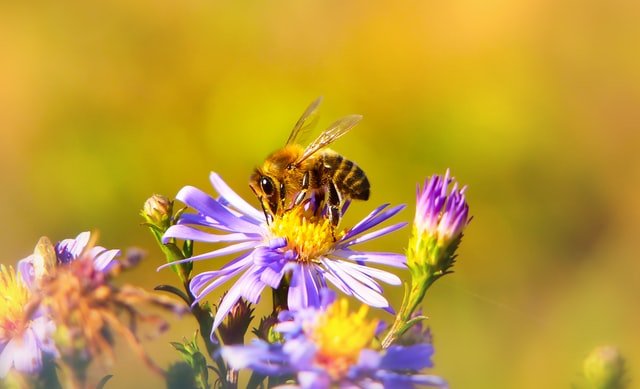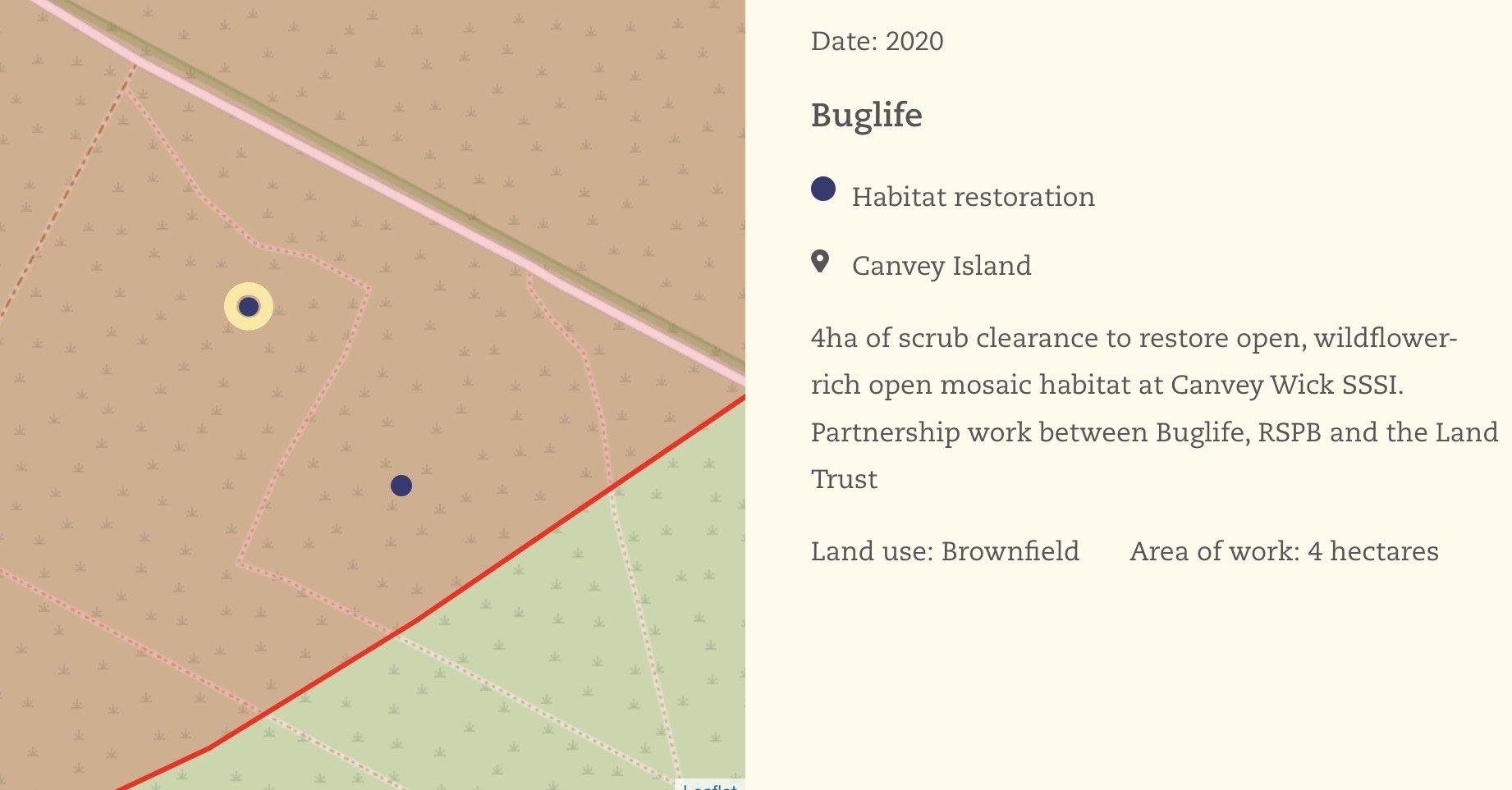The Plight of our Bees
Did you know “one out of every three mouthfuls of our food depends on pollinators”? World Wildlife Fund.
We are so reliant upon these insects yet our methods of food production and urban spread means they are dying at an alarming rate. For many years now environmental groups have been pushing for the ban of toxic pesticides and the increase in wildflower habitats. Up till now they have been largely ignored. Hopefully it is not too late to reverse the damage done and to restore the pollinator population back to what it needs to be. There have been some good decisions recently such as many UK councils reducing the cutting of grass to allow wildflowers to populate roadside verges. Insects have always had their own imaginative network to help them navigate from flower to flower, but as the landscape has changed significantly over the last 70 years with urban development, modern farming methods and ever increasing transport links, what was once open countryside with wildflower-rich habitat, these natural insect ‘paths’ have now been drastically reduced. The more pressure we put on our councils to allow public open areas with grass to grow wildflowers, the more chance it will give insects to rebuild their invisible network.
UK rapeseed field
B-Line map
Wildflower meadow
Imagine Britain had no rail or road network and you had to map out your journey using memorable places, buildings and landmarks. Think how strenuous and confusing that would be and how often you might get it wrong. To help the general public and councils alike recreate this vital network for insects, the environmental organisation BugLife has developed an innovative solution called B-Lines, that you can be part of.
B-Lines are “a series of ‘insect pathways’ running through our countryside and towns. They link existing wildlife areas together, creating a network, like a railway, that will weave across the British landscape” (BugLife) which will give our pollinators the road map they so desperately need to survive.
B-Lines won the prestigious European Landowners Association’s Bee Award in 2016, in recognition that it is successfully encouraging farmers and land owners to reconsider their land management strategies and to include appropriate wildflower and traditional cottage garden flower areas for pollinators. But there is still a lot to be done and we can all contribute. If you have a garden, balcony or even just a window ledge, you can grow pollinator friendly flowers and then submit your pollinator project to the B-Line network map. It is a great time to start as March to October is when bees need you most. Try primrose, buddleia and marigolds.
The next step is for local councils to start cutting out pesticide use in public spaces as sadly toxic weedkillers are still being used and are having a huge detrimental effect on the wildlife and ecosytem. For further reading on this please do visit Pesticide_Free_Essex ‘s Facebook page or your local action group.
Bumblebee
Grass field
Honey bee
Lettuce crop
But what about the agricultural land in the UK? Did you know that only 2.8% of the total farmed area on agricultural holdings in the United Kingdom is organically farmed!? (UK Gov Dept of Environment, Food & Rural Affairs). More recently in the UK, we find ourselves with a Government willing to approve emergency use of thiamethoxam (a devastatingly toxic neonicotinoid insecticide) in order to save the British sugar industry. UK sugar beet crops have been suffering from abnormal levels of aphids due to the mild winter. These aphids carry the Virus Yellows disease and the crops are under severe threat. The successful application was made by British Sugar (the sole British producer of sugar from sugar beet), who promises “limited and controlled emergency use” on their website. The chemical has been authorised in the UK from March this year because sugar beet is a non-flowering crop.
The EU banned this substance in 2013, along with three other toxic neonicotinoid insecticides (imidacloprid, clothianidin and thiacloprid) as they recognised the high risk to bees and other pollinators. This ban is on flowering crops but the EU have also recognised these toxic substances have a detrimental effect to the entire ecosystem whether the crop is flowering or not. The emergency-approved insecticide is to be added as a coating to the seeds before they are planted rather than sprayed directly onto the crop, however, there is no guarantee the chemical will not leach into the soil and surrounding waterways.
B-Lines map
Honey comb
B-Lines map
As British Sugar buys up all the British produced sugar crop (which coincidently is predominantly grown in the East of England), it has considerable influence on how it is grown and is therefore able to lobby the Government. There are around 10,000 livelihoods and other businesses tied up within the UK sugar industry that need protection, so facing crop devastation is obviously a very serious issue but as we have learnt the decline of the health of the environment and wildlife needs to be a far greater cause for concern. Although the sugar beet crop won’t flower, the weeds within it will, so it has also been agreed that industry-wide herbicides can be used to control the weed growth. So it seems they are adding yet another toxic layer to what is already a rather toxic problem. Sandra Bell, pesticides campaigner for Friends of the Earth said: “This should not be allowed. The government and industry must redouble their efforts to find alternative and effective pest and disease control for farmers – focusing on agroecological methods that work with nature, not against it. This must be central to the new National Action Plan on pesticides that the government is now drawing up.”
Intense public pressure on the Government to develop another strategy that involves non-toxic land management and crop growing is the only way to reverse this emergency approval. Links to sign the petition below. If we do not stop it we will soon find land that is un-farmable and no insects left to pollinate it.
British Sugar do seem to be making a move to develop alternative options instead of relying on neonicotinoids in the future as per their statement on their website: “Across the homegrown sugar industry, we continue to progress our plans to tackle Virus Yellows without the need for neonicotinoids in future years, such as through grower practices and seed breeding programmes”. However that doesn’t affect the immediate issue they face now. By pushing for this emergency approval, it appears they are protecting their own interests first and foremost with very short term thinking. And the authorisation of such chemicals seems to be shrouded in secrecy as Friends of the Earth states on its website that it has had to repeatedly resort to Freedom of Information legislation for documents that should be open to public scrutiny. Along with reduced use of pesticides, there needs to be a serious improvement in the transparency in decision making.
I for one, am deeply saddened about this news as we have reached a critical point in the survival of bees. So what can we do?
If you are as worried about this as me, then you can:
SIGN Greenpeace Petition : Save bees from deadly pesticides
CREATE a B-Line wildflower garden and/or encourage your school and local park to do so
BUY organic sugar produced in countries like Germany, Denmark and Austria
Together we can ensure we all have a beautiful, healthy planet.
Zoë x
Further reading
Watch the BugLife video here which explains how it works.
Check out ten amazing Bee Facts here!
Photography
Rapeseed field - Nick Fewings, Unsplash
Honeycomb - Ante Hamersmit, Unsplash
Wildflower meadow - Chris, Unsplash
Foxglove bee - Stacie Clark, Unsplash
Growing grass - Craig Cooper, Unsplash
Flower bee - Krzysztof Niewolny, Unsplash
Lettuce field - Lavi Perchik, Unsplash
B-Line maps from Buglife.org.uk website
References
Bee Facts: https://www.wwf.org.uk/learn/fascinating-facts/bees
B-Lines: https://www.buglife.org.uk/our-work/b-lines/
British Sugar: media statement
Government update: decision
This blog, website and its content are copyright of Beautiful Healthy Home Ltd - © Beautiful Healthy Home Ltd 2021. All rights reserved.
Any redistribution or reproduction of part or all of the contents in any form is prohibited other than you may print or download to a local hard disk extracts for your personal and non-commercial use only
You may not, except with our express written permission, distribute or commercially exploit the content. Nor may you transmit it or store it in any other website or other form of electronic retrieval system.









